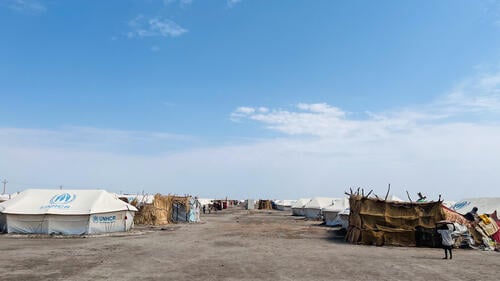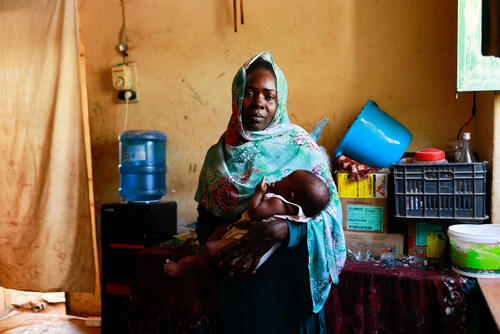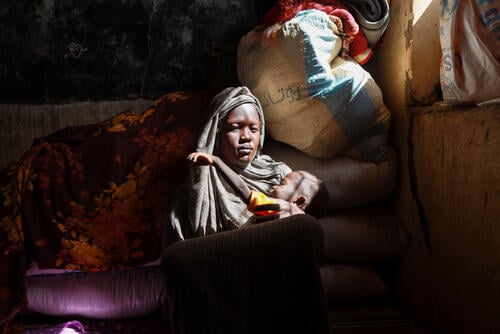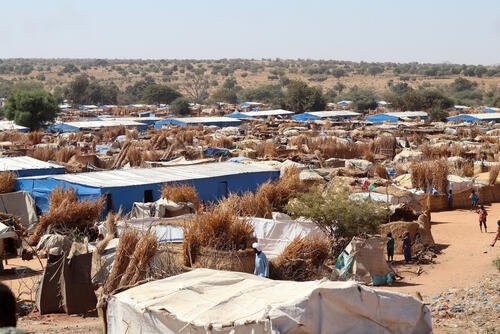More than 140,000 people, mostly South Sudanese women and children fleeing from Khartoum, have newly arrived in White Nile state since conflict broke out in Sudan. They are now facing huge unmet needs for food, shelter, healthcare, and water and sanitation in 10 camps, which host around 387,000 people, according to local authorities.
Médecins Sans Frontières (MSF) teams working in some of these camps are overwhelmed with tens of daily cases of suspected measles and malnutrition among children.
As more people arrive, there is an urgent need to scale up assistance, including nutritional support and provision of shelter, food, clean water, sanitation and measles vaccinations to curb an outbreak.
“Every day, more people arrive, and the numbers are increasing. In turn, this increases the need for improved health services, food and shelter,” says Ali Mohammed Dawoud, MSF medical activity manager.
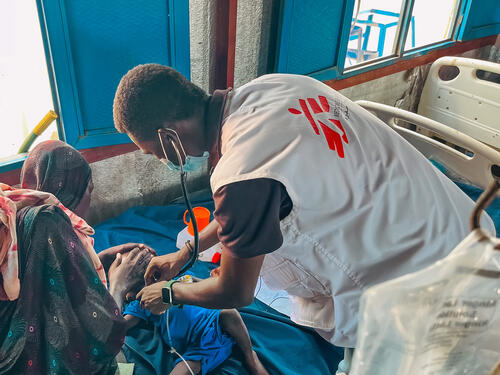
In June, our teams started supporting three Ministry of Health clinics in providing general healthcare in Um Sangour and Al Alagaya refugee camps, as well as in Khor Ajwal, which hosts Sudanese people displaced from Blue Nile state.
More recently, we have started supporting the inpatient therapeutic feeding centre at the hospital in Al Kashafa refugee camp, where there are about 50 severely acute malnourished children admitted, some of whom have been referred from other refugee camps.
Um Sangour, a camp meant to host about 30,000 people, now houses over 70,000. The needs are huge and growing in the overcrowded camps. “The most common illnesses impacting the community here, especially children under the age of five, are suspected measles, pneumonia, and malnutrition,” says Ali.
“The death toll was already high when we arrived. We received an average of 15 to 20 suspected measles cases daily, with six recorded deaths in the first week.
“Tragically, most of these were children under the age of five. We partnered with the Ministry of Health, who provided us with resources to set up an isolation centre to provide these children with the necessary care,” says Ali.
Measles is taking lives swiftly... If someone falls sick in the morning, they often don't survive until the evening.Philip*, a young man at one of the clinics in White Nile state.
“Today, we conduct an average of 300 to 350 consultations daily, including 30 to 40 cases of suspected measles. We also have a delivery room for pregnant women and assist one to two births per day and conduct about 20 to 30 follow-ups (antenatal care services) for pregnant women. Our routine immunisation services include 30 to 40 children per day,” says Ali.
For several weeks MSF has been advocating with the local health authorities to mobilise available measles vaccines, already in the country, to carry out a mass vaccination of children across White Nile.
At the same time, in order to scale up medical and relief activities, we need a significant increase of staff, including additional international specialists, as the teams working on the ground are already overstretched and exhausted.
The current conflict has left Sudan without lab capacity to identify disease outbreaks. Across the border in Renk and Malakal, South Sudan, a measles outbreak has been confirmed among people who fled the conflict. Over 100,000 people are estimated to have already crossed the border from Sudan to South Sudan.
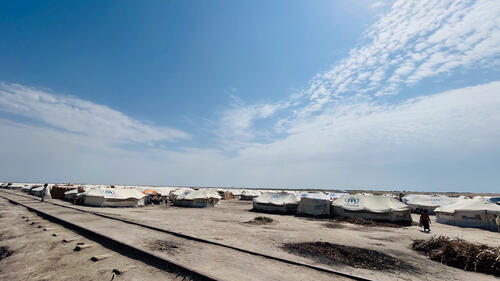
Among the measles patients our teams have treated and screened in Malakal, over 90 per cent are unvaccinated, indicating that there has also been a disruption in routine vaccination programmes in Sudan.
“My niece is suffering from fever and diarrhoea, and she's also vomiting,” says Philip*, a young man waiting with his sister and her daughter at one of the clinics in White Nile state. “Although she was prescribed medication, we couldn't find it at the pharmacy.
“Unfortunately, there's a severe shortage of medication here. Measles is taking lives swiftly. The fever is proving lethal. If someone falls sick in the morning, they often don't survive until the evening,” he says.
Elsewhere at the clinic, a pregnant woman, Hamida*, waiting with her sick child describes the other challenges people face.
“There was intense bombing in our neighbourhood. My family of eight and I fled Khartoum two months ago. Here, our situation is challenging because we're new arrivals, and we haven't received any assistance.
There was intense bombing in our neighbourhood. My family of eight and I fled Khartoum two months ago.Hamida*, a pregnant woman displaced in White Nile state
“We've struggled to secure food. So far, we've only received plastic sheets. Numerous people are waiting for food and shelter materials; there is no space for shelters.
“The conditions are incredibly difficult; many people are living outdoors because they lack proper shelter. The water here is unclean, leading to sickness among the residents. If you drink the water, you’ll have diarrhoea and start to vomit,” says Hamida.
The annual rains have already started, which may lead to a rise in waterborne diseases such as cholera and malaria, which is endemic to the area.
In the overcrowded camps, people have few options to provide for themselves or their families, relying on assistance. Some have been supported with food from refugees and relatives living in the camps before the escalation of conflict.
As more people arrive, there is a great need to scale up assistance. This urgently requires more staff, including staff experienced in managing such crises and emergencies, and securing shorter supply routes directly to White Nile state from abroad.
*Names changed to protect identity.
In just over three months of intense fighting in Sudan, more than three million people have been forced to leave their homes to save themselves and their families from conflict (UNOCHA). More than 2.1 million have been displaced by conflict, seeking refuge within Sudan. According to the International Organization for Migration, some of the highest numbers of displaced people are sheltering in White Nile state along with West Darfur, River Nile and the Northern states.



